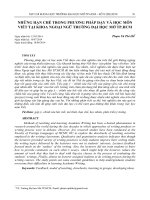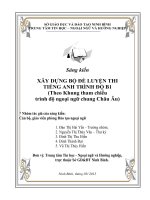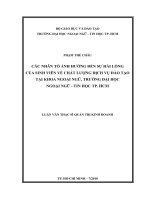Mẫu đề thi chứng chỉ Tiếng Anh theo CEFR tại ĐH Ngoại Ngữ, ĐHQGHN
Bạn đang xem bản rút gọn của tài liệu. Xem và tải ngay bản đầy đủ của tài liệu tại đây (513.88 KB, 11 trang )
Mẫu đề thi chứng chỉ Tiếng Anh theo CEFR tại ĐH Ngoại Ngữ, ĐHQGHN
________________________________________
Transcripts phần Nghe
1. Carla said that you were rather rude.
It’s unfair of her to say that about me.
WHAT DOES THE MAN MEAN?
2. I don’t think this painting is very good.
It’s better than the first one, isn’t it?
WHAT DOES THE WOMAN SAY ABOUT THE PAINTING?
3. Your graduation ceremony is this afternoon.
I can’t believe it. I’ve graduated at last!
WHAT DOES THE MAN MEAN?
4. I got this dress for only five dollars! Five dollars! How did you get it so cheap?
WHAT DOES THE MAN MEAN?
5. I just got my third parking ticket this week.
Why don’t you try putting more money in the parking meter when you park your car?
WHAT DOES THE WOMAN SUGGEST THAT THE MAN DO?
6. Were you able to get hold of the book that you wanted?
I couldn’t. At the bookstore, they told me that it wasn’t available yet.
WHAT DOES THE MAN MEAN?
7. Professor Mitchell’s lecture certainly went on and on for quite some time.
I thought he was never going to finish.
WHAT DOES THE MAN IMPLY ABOUT THE LECTURE?
8. You don’t have the notes from yesterday’s physics class?
No, I don’t. Do you think I could borrow yours?
WHAT DOES THE WOMAN MEAN?
9. You said that you wanted to go shopping this afternoon. What do you want to get?
I think I’d like to get my dad a new wallet for his birthday.
WHAT DOES THE WOMAN MEAN?
10. You didn’t go into the pool, even for a quick dip?
I put my big toe in and decided that the water was too cold for me.
WHAT DOES THE MAN MEAN?
11. Do you know where your sweater is?
I think I left it at my sister’s house, but I’m not sure.
WHAT DOES THE WOMAN MEAN?
12. I need for you to work on these new accounting reports.
But I scarcely have time to finish the ones I already have.
WHAT DOES THE WOMAN IMPLY?
13. How much longer do you think you’re going to stay on that exercise machine?
I give up!
WHAT DOES THE MAN MEAN?
14. Look at those waves coming in. They’re as huge as I’ve ever seen them.
You can say that again!
WHAT DOES THE MAN MEAN?
15. Are you ready for the political science exam today? I stayed up all night studying
for it.
Didn’t you know that the professor put it off until next week?
WHAT DOES THE WOMAN MEAN?
16. I haven’t turned in my schedule change form yet. Do you think that’s a problem?
You haven’t turned it in yet? It’s absolutely essential that you turn the form in
immediately.
WHAT DOES THE MAN MEAN?
17. I’d like to try on some rings, please. Do you prefer rings in gold or silver?
WHERE DOES THIS CONVERSATION PROBABLY TAKE PLACE?
18. Look at this. You made an awful lot of long distance calls last month.
I called my family even more than usual. That’s why the bill’s so much higher than
usual.
WHAT ARE THE MAN AND WOMAN PROBABLY DISCUSSING?
19. What do you think of your new boss?
I couldn’t be more impressed with him.
WHAT DOES THE WOMAN MEAN?
20. Mike, do you know when the recital starts?
It starts at three o’clock, doesn’t it?
WHAT DOES MIKE MEAN?
21. If your tooth is hurting you so much, perhaps you should see your dentist right
away.
I don’t really want to, but I guess I don’t have much choice.
WHAT WILL THE MAN PROBABLY DO NEXT?
22. I need to buy some stamps.
Then you’d better get to the post office quickly, because it closes at five o’clock.
WHAT CAN BE INFERRED FROM THE CONVERSATION?
23. Do you know how I can find the journal article that we’re supposed to read for
class tomorrow?
The professor copied it and put it on reserve in the library.
WHAT DOES THE MAN MEAN?
24. I really think you should try to be a little calmer.
If I were any calmer, I’d be asleep.
WHAT DOES THE MAN MEAN?
25. I don’t think that news report can possibly be true.
Neither do I!
WHAT DOES THE WOMAN MEAN?
26. Has management decided on a new policy for pay raises?
It’s still up in the air. I think it will be discussed again at the meeting next Friday.
WHAT DOES THE MAN MEAN?
27. I can’t believe it’s snowing today.
It wasn’t exactly unexpected.
WHAT DOES THE MAN MEAN?
28. How do you think you did on the literature exam that you had this morning?
I really wish I could take it over again.
WHAT DOES THE WOMAN IMPLY?
29. You didn’t have to wait outside. You could’ve just opened the door and walked
right in.
So the door was not locked!
WHAT HAD THEMAN ASSUMED?
30. My guess is that you’re leaving the office now and heading straight home.
You’ve hit the nail on the head!
WHAT DOES THE WOMAN SAY ABOUT THE MAN?
Part B
Questions 31-34
(narrator) Listen as a man and woman discuss a haircut.
(woman) Hi, Bob. Your hair looks nice. It’s a bit shorter than usual, isn’t it?
(man) A bit shorter? I don’t think so. It’s a lot shorter. When I look in the mirror, I
don’t even know who is looking back at me.
(woman) So you got your hair cut, but you didn’t get the haircut that you wanted?
(man) This is not even close to the haircut that I wanted. I asked to have hair trimmed
just a little bit, and the hairstylist really went to town. When I looked down at the
floor, there were piles of hair, my hair, on the floor. I couldn’t believe it!
(woman) Well, what did you say to the hairstylist?
(man) What could I say? The hair was
already cut off. I couldn’t exactly say, “Please put it back on,” although that’s exactly
what I did want to say.
(woman) Well, at least your hair’ll grow back soon.
(man) That’s what everyone is saying to me, “It’ll grow back, it’ll grow back. But it
won’t grow fast enough to make me happy.
(woman) Maybe after you get used to it, you’ll like it a bit more.
31. WHAT SEEMS TO BE TRUE ABOUT BOB’S HAIRCUT?
32. HOW DOES BOB SEEM TO FEEL ABOUT HIS HAIRCUT?
33. WHAT DID BOB SEE ON THE FLOOR?
34. WHAT DO PEOPLE KEEP SAYING TO BOB?
Questions 35-38
(narrator) Listen to a conversation about a man’s great-grandmother.
(man) I talked to my great-grandmother on the phone this morning.
(woman) Your great-grandmother? Do you talk with her often?
(man) I try to call her at least once a week.
She’s a really wonderful woman, and she’s over eighty-five years old. I enjoy talking
to her, because she’s so understanding and because she gives me good advice.
(woman) What advice did she have for you today?
(man) (laughs) She told me to be careful because a big storm is coming.
(woman) She said that a big storm is coming? Is she a weather forecaster?
(man) Not exactly. She says that she can feel it in her bones when a storm is coming. I
know it sounds funny, but when she feels it in her bones that a storm is coming, she’s
usually right.
(woman) That’s not actually so funny. When people get older, the tissue around their
joints can become stiff and swollen. Just before a storm, the air pressure often drops,
and this drop in air pressure can cause additional pressure and pain in swollen joints.
So when your great-grandmother tells you she thinks a storm is coming, she probably
has some aching in her joints from the decreasing air pressure.
(man) Then, I had better pay more attention to my great-grandmother’s weather
forecasts!
35. HOW OFTEN DOES THE MAN USUALLY TALK TO HIS GREAT-
GRANDMOTHER?
36. WHAT DID THE MAN’S GREAT-GRAND-MOTHER TELL HIM ON THE
PHONE THIS MORNING?
37. WHERE DOES THE MAN’S GREAT-GRANDMOTHER SAY THAT SHE
FEELS A STORM COMING?
38. WHAT WILL THE MAN PROBABLY DO IN THE FUTURE?
Part C
Questions 39-42
(narrator) Listen to a talk by a tour guide in the Everglades National Park.
(man) Today we’re going to be taking a tram tour through part of the Everglades
National Park. Quite probably we’ll be seeing a number of crocodiles sunning
themselves by the side of the water or poking their heads up through the water.
Needless to say, we will not be getting off the tram at any time until we leave the area
because of the danger posed by the crocodiles.
By the way, you’ve probably heard of the expression “crying crocodile tears.” It is
common to say that someone is crying crocodile tears when he or she is pretending to
be sad or full of regret. Crocodiles always appear to have tears in their eyes, but they
are not crying because of sadness, or even pretended sadness. Instead, a crocodile uses
its tear ducts to get rid of extra salt from its body. A crocodile does not sweat the same
way that humans do and must get rid of extra salt through tears. So if you see a crying
crocodile, do not think that it’s feeling sad; it is basically sweating through its eyes.
Look! Over there on the right. There are two large crocodiles on the water’s edge,
right next to the fallen trees. You can get out your cameras and take pictures from here
on the tram, but no, you cannot get off the tram to get any closer.
39. WHERE DOES THIS TALK TAKE PLACE?
40. WHAT DOES THE EXPRESSION “CRYING CROCODILE TEARS” MEAN
WHEN IT IS USED TO DESCRIBE HUMANS?
41. WHY DO CROCODILES HAVE TEARS IN THEIR EYES?
42. WHAT DOES THE TOUR GUIDE RECOMMEND?
Questions 43-46
(narrator) Listen to the following lecture by a university professor.
(woman) Please take your seats now because I would like to begin today’s lecture.
Today, we will be discussing one of the more elegant and distinct forms of nineteenth-
century transportation— the clipper ship.
Clipper ships of the nineteenth century were the graceful, multisailed, oceangoing
vessels that were designed for maximum speed. They were given the name “clipper”
ship in reference to the fact that they “clipped along” at such a fast rate of speed.
Clipper ships were constructed with a large number of sails in order to maximize their
speed. They often had six to eight sails on each of the masts, and ships commonly had
three and perhaps four masts. The speeds that they achieved were unbelievably fast for
the era; clipper ships could, for example, accomplish the amazing feat of traveling
from New York to San Francisco in less than a hundred days.
Clipper ships first came into use in the United States in the 1840s. They were
originally intended to make the trip from New York, around the tip of South America,
and on to China in order to transport tea to the United States. Once gold was
discovered in California in 1848, clipper ships were immediately put into use to carry
large numbers of gold prospectors and large amounts of mining supplies from the East
Coast to California.
With the success of the American clipper ships, the British began their own fleet of
clipper ships to transport goods from the far reaches of the British Empire.
That’s all for today’s class. Don’t forget that there’s a written assignment due on
Friday.
43. IN WHICH COURSE WOULD THIS LECTURE MOST PROBABLY BE
GIVEN?
44. WHAT IS THE MOST LIKELY MEANING OF THE EXPRESSION “TO
CLIP ALONG”?
45. WHAT WERE CLIPPER SHIPS FIRST USED FOR IN THE UNITED
STATES?
46. WHAT DOES THE PROFESSOR REMIND THE STUDENTS ABOUT?
Questions 47-50
(narrator) Listen to the following talk by a drama coach to a group of actors.
(man) I know that some of you are feeling more than a little nervous about tonight’s
performance, and I want you to understand that this is quite a natural feeling. You are
going to be on a stage in front of a lot of people tonight, and it’s normal to be
experiencing some nerves. I would like to help you to understand these feelings
and not to let them interfere with your performance.
What you are experiencing is called stage fright. Stage fright is the fear that develops
before you give a performance in front of an audience. Stage fright is not just
experienced by actors and actresses; it can also be experienced by musicians, athletes,
teachers—anyone who performs in front of a group of people. It occurs before a
performance when a performer is concerned about looking foolish in front of others.
Just before tonight’s performance, if you are feeling a bit tense, if your knees are
shaking, if your stomach has butterflies in it, and if you are thinking about how bad
your performance could be, then you have a major case of stage fright.
To control stage fright, you can work to control both the physical reactions and the
negative thoughts. To combat the physical reactions, you can try techniques such as
deep breathing, muscle relaxation, or even just laughing to relieve some of the
pressure. To combat the negative thoughts, you should force yourself to focus on what
you have to do rather than on what other people are going to think.
That’s all I have to say for now. I’ll see you back here at six o’clock because the
performance starts at eight o’clock. Just remember that if you begin to feel at all
nervous, try some deep breathing to relax and focus your thoughts on the performance
that you are about to give. See you this evening.
47. WHO WOULD PROBABLY NOT EXPERIENCE STAGE FRIGHT IN THEIR
WORK?
48. WHAT PHYSICAL REACTION MIGHT SOMEONE WHO IS EXPERIENCING
STAGE FRIGHT COMMONLY HAVE?
49. HOW CAN SOMEONE COMBAT THE NEGATIVE THOUGHTS
ASSOCIATED WITH STAGE FRIGHT?
50. WHEN SHOULD THE ACTORS ARRIVE AT THE THEATER?
WRITING
SAMPLE ANSWER
Part 1
Dear Dave,
I am writing to let you know that at last we have moved to a bigger house! We just
couldn’t go on living in the two bedroom bungalow now that the twins are growing up
and the new baby has arrived. So we started looking – and one thing led to another and
finally here we are in our new home.
I’m sure you’ll like it. We have three bedrooms now, and a very modern bathroom and
kitchen. The kids are happy because there is much more space with the big living room
and the garden outside. But Michel is the happiest of all because he doesn’t need to do
much decorating.
Why don’t you come round this weekend and see what you think of our new place?
We would all love to see you and if the weather is good we can have a barbecue in the
garden.
Our new address and phone number are below, so give us a call and let us know when
to expect you.
Lots of love,
Francoise
Part 2
Today more people are travelling than ever before. The reasons for this increase are
many and varied.
On a simplistic level, there are larger numbers of means of transportation - there are
more cars, buses and trains in operation. However, the sheer number of transportation
means is not enough to explain this increase. The cost of travelling; even though it is
at present increasing due to an economic slowdown globally; is still relatively
affordable to many people. This affordability is further enhanced by the use of credit
cards and loans in order to fund travel, especially for holiday purposes. An increase of
travel companies in competition with each other has also helped bring package prices
down, while an increase in the number of operating flights globally has also increased,
giving rise to falling air-fare prices. In addition, people now have more leisure time
and disposable incomes. The combination of these two variables with unrelenting
advertising campaigns from travel companies and cruise ship operators arguably leads
to an increase in the number of people travelling, in this case for holiday purposes.
Another reason why people travel is going to work. More than ever before, people are
travelling greater distances to get to work. Large industrial sites for both service and
production industries are tending to be located outside city areas. This invariably leads
to increases in the number of people travelling locally.
In conclusion, there are many reasons why more people are travelling both
internationally and locally, for business and for Leisure. What is sure is that this
increase is likely to continue until travelling at current rates is no Longer economically
viable.
SPEAKING
PART I: INTERVIEW (2-3 minutes)
May I have your full name, please?
Where were you born?
I was born in Hung Yen province, which is not very far from here. You know my
hometown is very famous for the delicious longan.
Where do you live? Do you live in a house or an apartment?
I live in a small house in Hanoi. There are four rooms in my house: a kitchen, a
bathroom and two bedrooms.
I live in a small apartment/ flat in Trung Hoa Nhan Chinh urban area. My flat is
on the fifth floor and it has four rooms: a kitchen, a bathroom and two bedrooms.
How long have you lived there?
I’ve been living there since I got married. I love the neighbourhood because it is
not very far from my company and my children’s schools.
PART 2: LONG TURN (4-5 minutes)
Ask the candidate to talk about the topic he/she has chosen.
Describe a place which you think is beautiful.
You should say:
What that place is like
How you can get there from here
What kind of people usually go there
And say why you think it is beautiful.
Halong Bay is one of the most beautiful places in Vietnam. It was first recognized
as the World Natural Heritage site in 1994. It is located about 150 km from Hanoi
and it takes about more than 3 hours to get there by car.
Halong is famous for its breathtaking view of thousands of limestone mountains
rising from water. There are many activities for visitors coming there. For example,
visitors can go on a cruise to explore the wonderful view of the bay and visit many
interesting caves such as Surprising cave, Dau Go Cave and so on. Moreover, for
those who are interested in learning people’s ways of life, they can go to some
fishing villages or see how people raise fish in their fish farms. Some water sports
are also available on request, for instance, kayaking.
I have been to Halong Bay once since last year on a trip my company organized.
We rented the whole boat to discover the Bay. I enjoyed the trip a lot and I hope
that I will travel to Halong Bay again with my family next Summer.
PART 3: TWO-WAY DISCUSSION (3-4 minutes)
Is your country the best place for you to live?
I think Vietnam is the best place to live because here I live near my parents.
Besides, there are many beautiful places in Vietnam to visit and Vietnamese
people are very friendly as well.
Would you like to live where there is desert and hot weather?
No, I wouldn’t. It is too hot for me to live in such places. I can’t stand the heat and
it’s difficult to make a living I think.
Would you like to live where there is always snow?
No, I wouldn’t. I don’t want to live in such harsh weather. Moreover, I’m easy to
catch a cold. It would be fine if I lived in Korea because it snows only in the
winter.
Where would you like to go for your next holiday?
I’m planning to go back home on my next holiday because I haven’t been back for
three months. I am going with my family and going to visit my parents and some of
my close relatives there. I am planning to get together with some old friends in the
café near my house, too. …









